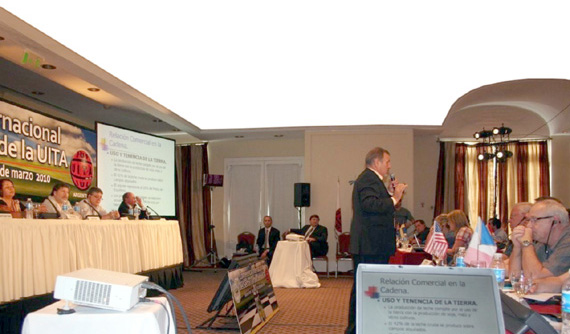Dairy workers: the strategy for the future is global
unity
After representatives of top government agencies and
trade union organizations connected with Argentina's
dairy sector opened the Conference, evidencing the
broad base of representation and plurality of the
participants, the members of the panel expressed
their optimism over the outcome of the event,
stressing the unique possibility it provides for
strengthening global coordination among dairy
workers.
The first part of the Conference featured
presentations from representatives of the processing
industry, small and medium-sized companies (SMEs)
and dairy producers, who offered quite diverse
views.
Engineer Miguel Angel Paulón, president of
the Dairy Industry Center (CIL), highlighted
that the Center's members -both medium and large
companies-
process 65 percent of all the milk produced in
Argentina,
and said that with the current growth in domestic
and international demand and bearing in mind the
significant idle capacity that exists today, CIL
expects annual milk production to rise from 5,000 to
7,000 liters/hectare within five years, reaching an
annual production of 14 billion (up from the current
10 billion). This would not only allow the industry
to operate at full capacity, but would also bring
about a significant increase in employment.
For his part, engineer Pablo Villano,
president of the Association of Small and
Medium-Sized Dairy Companies (APYMEL), said
that the sector's SMEs work primarily for the
domestic market, and that the main difficulties they
face have to do with lack of investment in
technology and the inability to access the soft
loans available to large companies, a circumstance
he attributed to their low profit margin.
Villano's
presentation was followed by a different perspective
from Ricardo Garnero, a veterinary member of
the Milk Producers Association of the Province of
Santa Fe (MEPROLSAFE), who spoke from the
point of view of the dairy farmers who supply milk
to processing companies. Garnero referred to
issues that are key for the sector, such as the
mechanism for
setting prices, from which producers are excluded,
as prices are established unilaterally by the
processing companies, who he accused of
oligopolistic practices.
He said that
over
the last two decades one thousand dairy farms have
disappeared each year, bringing the number down to
10,557 production units.
“How much longer will this trend continue? How many
of us will be spared?” he asked.
He then pointed out that the country has a serious
problem in terms of land holding and use,
as at
present 42 percent of all milk production comes from
rented farms, and rents are charged according to the
estimated tons of soybean that a rented estate would
produce. This generates a huge distortion in costs,
as rent represents 18 percent of the market clearing
price for milk.
Lastly, in one of the highlights of the day,
Garnero called for the establishment of fairness
mechanisms in the sector through the adoption of
specific legislation that will introduce sustainable
criteria for income distribution in the dairy
industry.
The next speaker was the general secretary of the
Argentine Association of Dairy Industry Workers (ATILRA),
Hugo Ponce, who gave an overview of the
history of this trade union since its inception.
After showing a video on the subject, he noted that
while ATILRA's relations with the sector's
companies are currently very positive, this was not
always the case and is the result of a process of
several years, which included moments of great
confrontation.
He called for workers and companies to work towards
finding a common ground based on respect for labor
rights, negotiation and collective bargaining.
He urged participants to carefully and creatively
examine the future of the sector, as it is essential
to implement a strategy that involves a global
coordination of activities among dairy trade unions
from around the world.
IUF
general secretary Ron Oswald focused his
presentation on the international campaigns
conducted to combat antiunion actions by
transnational corporations in the food and hotel
industries, as well as other campaigns in countries
such as Pakistan, Turkey, the
Philippines and Indonesia. In several of
these cases, the global campaigns proved to be a
useful tool for trade unions.
He also pointed out that some companies, such as
Pepsico and Kraft, have refused to
acknowledge the IUF as a valid counterpart.
In other companies, such as Coca-Cola,
visible progress has been made towards building a
global alliance of the company's workers. Oswald
suggested that this is a strategy that could be
adopted by the trade unions of companies such as
Arcor, Kraft, Danone, Nestlé,
Unilever, InBev, SABMiller and
others, in the coming years.
The presentations then gave way to a general debate
in which several delegates reported on the current
situation of their unions, most of them representing
workers in transnational corporations such as
Nestlé, providing numerous examples. In
Nestlé's case, the IUF is presently
conducting a strong international campaign,
for which it has coined the term “Nespressure”
to describe this company's cynical attitude.
Today is the last day of the Buenos Aires
Conference, but activities will continue in the city
of Sunchales, province of Santa Fe.
